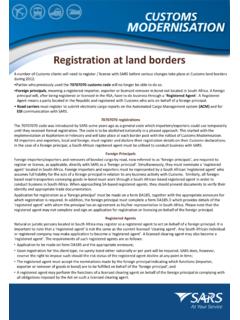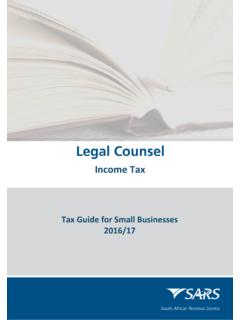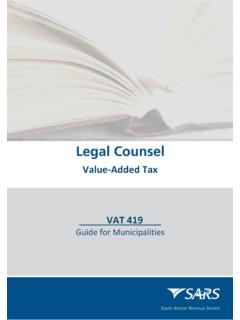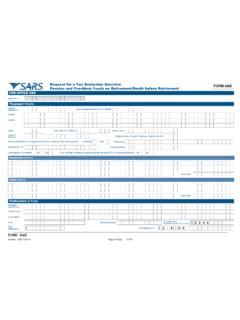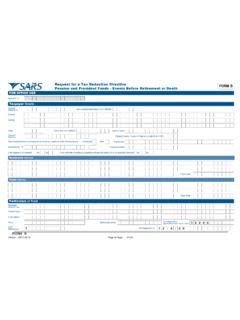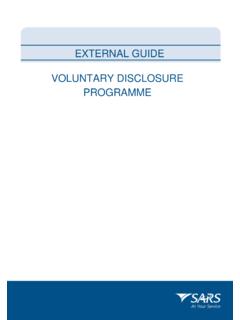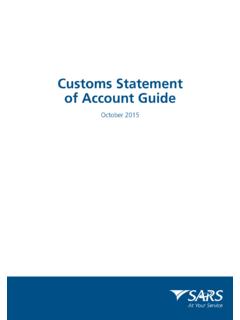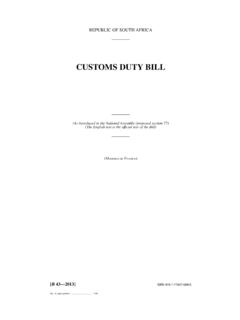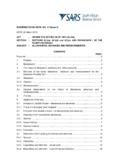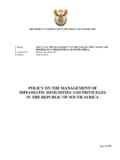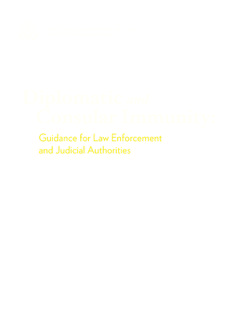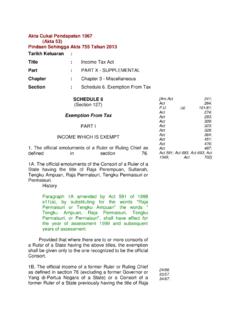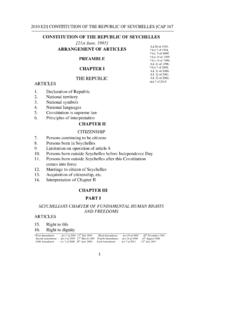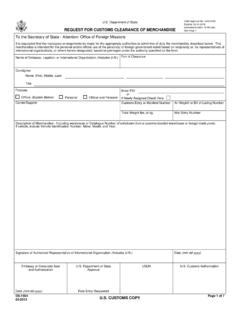Transcription of ACT : INCOME TAX ACT NO. 58 OF 1962 SECTION e: …
1 INTERPRETATION NOTE 45 (Issue 3) DATE: 24 August 2018 ACT : INCOME TAX ACT 58 OF 1962 SECTION : SECTIONS 11(a) AND (e), 18A, 22(8), 23(b) AND (g), 24D, PARAGRAPHS 2(a), (b), (e), (f) AND (h) OF THE SEVENTH SCHEDULE, PARAGRAPHS 20 AND 53 OF THE EIGHTH SCHEDULE AND PART II OF THE NINTH SCHEDULE SUBJECT : DEDUCTION OF SECURITY EXPENDITURE CONTENTS PAGE Preamble .. 2 1. Purpose .. 2 2. Background .. 2 3. The law .. 2 4. Application of the law .. 3 Expenditure of a domestic or private nature .. 3 Donations .. 4 Business-related expenditure.
2 5 Own business expenditure of a revenue nature .. 5 Contributions to anti-crime initiatives .. 6 (a) Cash contributions .. 7 (b) Contributions of trading stock .. 7 (c) Provision of services .. 7 Dual-purpose expenditure .. 8 Costs incurred in providing security to employees .. 8 (a) Employer .. 8 (b) Employee .. 9 Wear-and-tear or depreciation allowance .. 9 Deduction of certain expenditure incurred in respect of any National Key Point or specified important place or area under SECTION 24D .. 10 5. Conclusion .. 11 Annexure The law.
3 12 2 Preamble In this Note unless the context indicates otherwise Schedule means a Schedule to the Act; SECTION means a SECTION of the Act; the Act means the INCOME Tax Act 58 of 1962; and any other word or expression bears the meaning ascribed to it in the Act. All guides and interpretation notes referred to in this Note are available on the SARS website at Unless indicated otherwise, the latest issues of these documents should be consulted. 1. Purpose This Note provides guidance on the deductibility of security expenditure incurred by a taxpayer for INCOME tax purposes.
4 It also examines the fringe benefits tax implications for employees when their employers fund such expenditure. 2. Background Taxpayers incur a variety of expenditure for the purpose of preventing and combating crime in South Africa. Such security expenditure usually falls within one of the following categories: Expenditure of a domestic or private nature Donations Business-related expenditure This Note examines each of these categories of expenditure. 3. The law The following provisions of the Act are relevant to this Note and are quoted in the Annexure.
5 SECTION 11(a) general deduction formula SECTION 11(e) wear-and-tear or depreciation allowance SECTION 18A deductible donations SECTION 22(8) deemed inclusion in INCOME of trading stock SECTION 23(b) prohibition on the deduction of domestic or private expenses SECTION 23(g) prohibition on deduction of moneys not laid out or expended for the purposes of trade SECTION 24D Deduction of certain expenditure incurred in respect of any National Key Point or specified important place or area Paragraph 2(a), (b), (e) (f) and (h)
6 Of the Seventh Schedule taxable benefits derived by reason of employment or holding of any office 3 Paragraphs 20 and 53 of the Eighth Schedule the base cost of assets and the disregarding of capital gains and capital losses on personal-use assets respectively for capital gains tax purposes Part II of the Ninth Schedule public benefit activities for purposes of SECTION 18A 4. Application of the law Expenditure of a domestic or private nature SECTION 23(b) prohibits the deduction of domestic or private expenditure.
7 In CIR v Hickson,1 Beyers JA stated the following: Domestic and private expenses are, I should say, without attempting an exhaustive definition, expenses pertaining to the household, and to the taxpayer s private life as opposed to his life as a trader. Thus the cost of securing an individual s private residence does not qualify as a deduction. Examples include defensive walls, burglar alarms, electric fences, razor wire, guard dogs, insurance, 24-hour monitoring and armed-response services. A taxpayer who uses part of a private residence for purposes of trade, for example, a home office, must make an appropriate apportionment of the security expenditure incurred (see ).
8 Capital gains tax Some security expenditure may qualify as part of the base cost of immovable property held for domestic or private purposes, such as a primary residence or holiday home. Paragraph 20(1)(e) of the Eighth Schedule includes in the base cost of an asset the expenditure actually incurred in effecting an improvement to or enhancement of the value of that asset, if that improvement or enhancement is still reflected in the state or nature of that asset at the time of its disposal.
9 Examples of such improvement or enhancement expenditure include the cost of installing an electric fence or the cost of a burglar alarm system which is integrated into the fabric of a building. To qualify for inclusion in the base cost of an asset, the relevant improvement must still be on hand at the time of disposal of the property. Owners of sectional title units have an undivided share in the common property. Sometimes they are required to pay a special levy for the purpose of effecting improvements to the common property, such as the installation of a security fence.
10 Expenditure of this nature will normally be of a capital nature as it provides an enduring benefit. Since it enhances the value of the owner s right in the common property, it forms part of the base cost of the sectional title unit. The same principle applies to owners of share block units who enjoy a right of use in the common property, since such expenditure will enhance the value of their right of use. Movable assets, used by individuals mainly for non-trade purposes, such as firearms or private vehicle tracking or alarm systems are personal-use assets as 1 1960 (1) SA 746 (A), 23 SATC 243 at 249.
